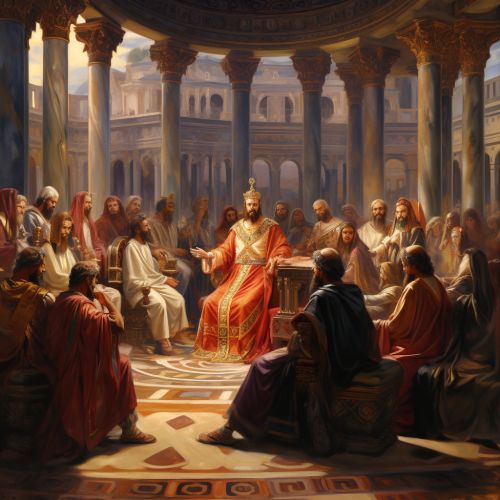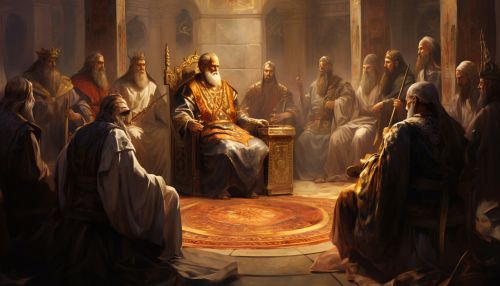First Council of Nicaea
Background
The First Council of Nicaea was a council of Christian bishops convened in the Bithynian city of Nicaea (now İznik, Turkey) by the Roman Emperor Constantine I in AD 325. This council is recognized as the first ecumenical council of the church. Most significantly, it resulted in the first uniform Christian doctrine, called the Nicene Creed. With the creation of the creed, a precedent was established for subsequent local and regional councils of Bishops (Synods) to create statements of belief and canons of doctrinal orthodoxy—the intent being to define unity of beliefs for the whole of Christendom.


Historical Context
The council was the first effort to attain consensus in the church through an assembly representing all of Christendom. Its main accomplishments were settlement of the Christological issue of the divine nature of God the Son and his relationship to God the Father, the construction of the first part of the Nicene Creed, establishing uniform observance of the date of Easter, and promulgation of early canon law.
The Arian Controversy
The Arian controversy was a Christological dispute that began in Alexandria between the followers of Arius (the Arians) and the followers of St. Alexander of Alexandria (now known as Homoousians). The Arians did not believe in the traditional doctrine of the trinity, which held that God the Father, God the Son, and the Holy Spirit were three persons in one substance. Instead, they believed that God the Son was a subordinate entity to God the Father.
Convening the Council
Emperor Constantine summoned the bishops of the Christian Church from across the Empire to Nicaea. The bishops were given free travel to and from their episcopal sees to the council, as well as lodging. These bishops did not travel alone; each one had permission to bring with him two priests and three deacons, so the total number of attendees could have been above 1,800. Eusebius of Caesarea counted more than 250, Athanasius of Alexandria counted 318, and Eustathius of Antioch estimated "about 270" (all three were present at the council). Later, Socrates Scholasticus recorded more than 300, and Evagrius, Hilary of Poitiers, Jerome, Dionysius Exiguus, and Rufinus recorded 318.
Proceedings
The council was formally opened by Constantine. After a sermon by the emperor, the Nicene Creed was introduced. The main work of the council, the settling of the Arian controversy, was brought up for discussion. The Arians presented their case first. After Arius and his followers had presented their views, they were rejected by the council, and Arius was exiled.
The Nicene Creed
The Nicene Creed was formulated, among other things, to clearly define the relationship between God the Father and God the Son, in response to the Arian controversy. The Creed states that the Son is "of one substance with the Father", a statement that the Arians disagreed with.
Aftermath and Legacy
The council resulted in condemnation and exile for Arius, along with two bishops who supported his heresy. The emperor also ordered all copies of the Thalia, the book in which Arius had expressed his teachings, to be burned. Nonetheless, the controversy continued in various parts of the empire.
The Council of Nicaea was historically significant because it was the first effort to attain consensus in the church through an assembly representing all of Christendom. It was the first occasion for the development of technical Christology. Further, it resulted in the first, uniform Christian doctrine, called the Nicene Creed.
